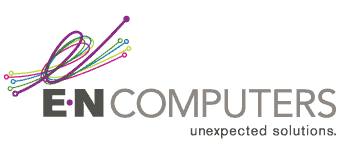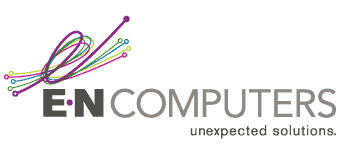
 by Scott Jack
by Scott Jack
Content Contributor, E-N Computers
Over 10 years of experience in healthcare IT and tech support.
If you are like many business leaders that already have IT staff, you are skeptical that in-house IT and an IT managed services provider (MSP) can work together successfully. Overlapping roles, communication gaps, costs, or a potential rivalry are all valid reasons for concern. But each of these issues can be overcome by recognizing that in-house IT offers unique benefits, clearly defining the roles of each, and building a collaborative partnership. The result for your business is a more efficient, flexible, and expert IT team.
QUICK ANSWER:
How can internal IT and an MSP work together?
An internal IT team and MSP don’t need to compete: they each bring unique benefits and can work well together. You will see the most benefit when their responsibilities are well defined, communication is open and honest, and compatible systems and processes are used. With the support of an MSP, your internal IT can stop putting out fires and shift attention to important projects, data analysis, or finally take a vacation.
Strengths of in-house IT
Three major strengths of in-house IT are 1) business familiarity, 2) fast on-site response, and 3) personalized user support.
Business familiarity
Your internal IT team is familiar with more than the technology you use — they understand how the company works. They are part of regular staff meetings, see how people and departments work together daily, and know the opportunities and challenges your company has had.
Because they work side-by-side with your team every day, your in-house IT team has a unique perspective on the needs of each department. They also have insight into the risks your company faces. This allows them to develop technical solutions that meet your goals and strategies to address vulnerabilities.
Fast on-site response
An in-house IT team can provide quick on-site response, which is especially valuable for hardware-related problems and critical issues. An MSP will try to troubleshoot remotely, create a ticket if they can’t resolve the problem, assign a technician, schedule a visit, and then travel to you to work on it. In far less time, your on-site IT person can walk down the hall and be face-to-face with the issue.
By responding to issues quickly, your in-house IT reduces disruptions and downtime. Because downtime is costly, this positively impacts your productivity and financials.
Personalized user support
Over time, your in-house IT builds relationships with the rest of your team. They get to know how tech savvy each person is, recurring issues certain users face, and the specific needs of each department. This allows them to customize onboarding and training and helps employees feel more comfortable about asking for help.
Strengths of MSPs
While your in-house IT team offers a deep understanding of your company, the major strengths of MSPs include 1) broad expertise, 2) advanced tools and technologies, and 3) scalability.
Broad expertise
When you face an issue, there’s a good chance we’ve dealt with it before. As an MSP, we work with clients across a range of industries and sizes. Our exposure to different companies and IT environments provides a broader perspective, puts us face to face with all kinds of technical issues, and hones our ability to solve your problems. Our broad experience enables us to quickly bring you proven solutions.
Current tools and technologies
You want to stay up to date with the latest tools and technology, which can be overwhelming to research, select, source, and implement. Our partnerships with major technology companies allow us to learn the advantages and peculiarities of products, source them reputably and quickly, and implement them in various configurations.
Once your new hardware or software is installed, we make sure it stays updated. Regular maintenance keeps your systems stable and secure so that you can focus on running your business instead of fighting the machines.
Scalability
With an MSP, you get IT support that can grow and adapt to your needs. We have the staff you need for everything from day-to-day support to large projects. We have proven processes to make sure every support ticket is handled promptly, that each project keeps moving forward, and that you have a strategy and budget in place to meet your goals. As a result, your internal team will have greater support and less pressure — they might even be able to take a vacation occasionally!
How in-house IT and MSPs can collaborate
Define clear roles
Look at the strengths of in-house IT and MSPs discussed above and think about how each of them can best contribute to your business. What roles and responsibilities should each have? It will look different for each business, but having clearly defined roles will help everyone to get more done while reducing misunderstandings and frustrations. Here are a couple of examples of how our clients have benefited from this kind of partnership.
Example 1: In-house day-to-day support
If your team is less tech savvy or often requires in-person support, you could dedicate your in-house IT person to daily support needs. They can handle tasks such as:
- onboarding
- user training and support
- tier 1 troubleshooting and problem resolution
- software installation
- account unlock and password reset
There are a few benefits to this. First, your in-house IT will be more familiar with each team member, how your business works, and where people and equipment are located. Second, whether they are on-site or working from home, they can more quickly respond to issues in-person. This focused level of day-to-day support may help your team to feel more valued.
With your in-house team focused on daily support, an MSP can focus on strategy, projects, and advanced support. They can handle tasks like:
- tier 2 and 3 troubleshooting and problem resolution
- hardware and software procurement
- technology roadmap and budget
- server and network management
- vendor management
Example 2: In-house business analyst
Another approach is to hire a business analyst (or CIO (Chief Information Officer)) to handle the data you handle, while entrusting an MSP with the underlying systems. This can be a particularly valuable approach if your users are more self-sufficient, and you’re interested in making more data-driven decisions. This kind of role can be a great fit for an IT person who is proactive, a critical thinker, and a good communicator. They can handle improving data collection, reporting, and operational processes. They will work closely with the MSP, who will handle systems implementation, maintenance, and day-to-day support.
For more information about roles, check out these articles:
- Should I hire an IT Support Manager or a Business Analyst?
- Which staff roles should coordinate with an MSP?
Regular communication
We believe that strong partnerships are founded on open communication, and we genuinely prefer clients who want to collaborate with us. That’s why we make it easy to reach our help desk, schedule the same technician for recurring focus days, schedule recurring executive reviews, and make it easy to talk with your account manager. During projects, we schedule more frequent meetings to give updates and promptly handle any issues that arise.
Shared tools and platforms
When you’re considering an MSP, make sure that they work with vendors and platforms that you already use (or that you are open to switching to what they use). E-N Computers focuses on supporting Windows systems, Dell servers and workstations, and Cisco Meraki networks. (See our Partners page.) We can provide the best support when you use these technologies.
Similarly, it’s good for your in-house IT and MSP to use the same tools and processes for things like tickets (work orders), documentation, collaboration, and training. This will allow them to track, manage, and resolve issues efficiently. Keeping documentation and training resources current and available to everyone will make sure that your team gets consistent, high-quality support.
How you benefit
By combining the strengths of in-house IT and MSPs, you can reap at least four benefits:
- enhanced efficiency
- cost savings
- flexibility and scalability, and
- comprehensive expertise
You get the organization-specific knowledge of an in-house IT team with the broad experience of an MSP, the ability to quickly scale up or down and achieve large projects, a full set of IT knowledge and skills at the fraction of the cost of a fully staffed internal IT department, and the right people handling each task promptly. Your internal IT will be complemented with additional resources and knowledge; they will also have a trusted partner when unexpected problems arise or when they need to take leave.
Next Steps
When you have the right people working together, you can implement systems and processes that actively help you reach your business goals. We sometimes call this IT maturity. But for many organizations, something is off when it comes to their partnerships, strategy, systems, and settings. How can you know what’s working well and where you have room for improvement? Start by taking our free IT Maturity Self-Assessment. You’ll walk away with some pointers and, if you want, a free appointment to discuss your results.
Take the IT Maturity Assessment

Is your business ready to weather changes, including employee turnover? Find out by taking our IT maturity assessment.
You’ll get personalized action items that you can use to make improvements right away. Plus, you’ll have the opportunity to book a FREE IT strategy session to get even more insights into your IT needs.

Industries
Locations
Waynesboro, VA
Corporate HQ
215 Fifth St.
Waynesboro, VA 22980
Sales: 540-217-6261
Service: 540-885-3129
Accounting: 540-217-6260
Fax: 703-935-2665
Washington D.C.
1126 11th ST. NW
Suite 603
Washington, DC 20001-4366
Sales: 202-888-2770
Service: 866-692-9082
VA DCJS # 11-6604
Locations
Harrisonburg, VA
45 Newman Ave.
Harrisonburg, VA 22801
Sales: 540-569-3465
Service: 866-692-9082
Richmond, VA
3026A W. Cary St.
Richmond, VA 23221
Sales: 804-729-8835
Service: 866-692-9082
